Resilient Systems, 2022
▣ TYPE: Postgraduate technical research
▨ INSTITUTION: Central Saint Martins MArch
▤ KEY MATERIALS: Eucalyptus / Hazel / Poplar / Sweet Chestnut / Sycamore
▦ METHODOLOGY: Site Survey / Drawing / 1:1 Mock-ups
▥ COLLABORATORS: Henry Stringer / Structure Workshop / Jez Ralph
As forestry practices shift to a more ecologically driven approach, we may be moving away from our more standard construction timbers. Short rotation coppice has the potential to deliver large volumes of timber at speed whilst providing rich habitat and eucalyptus is a climate resilient species that produces large section timbers at speed.
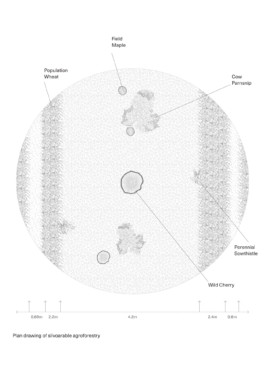
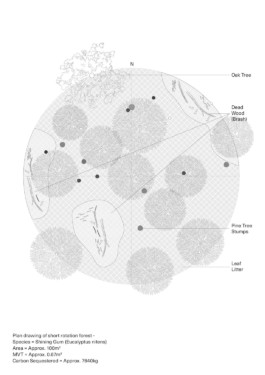
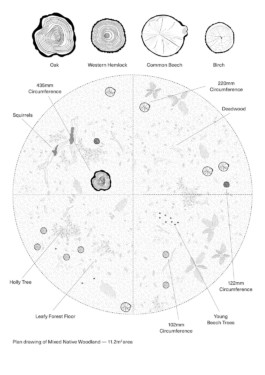
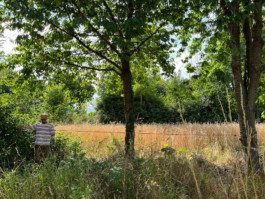
Many trees have as yet been neglected by UK classification systems such as grading which gives timber a structural rating which can be used by engineers irrespective of species. This makes them harder to specify, meaning either the engineer has to take conservative estimate of strength - leading to waste, or test a batch of timber - as well as additional costs, logistics and lead times. Familiarising ourselves with these timbers and demonstrating ways in which they can be applied in construction will be crucial in transitioning away from a monocultural approach to production.
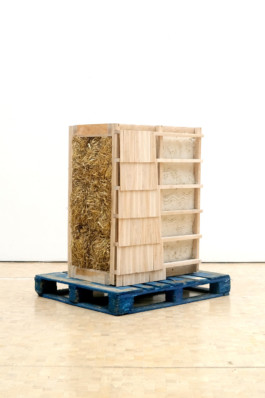
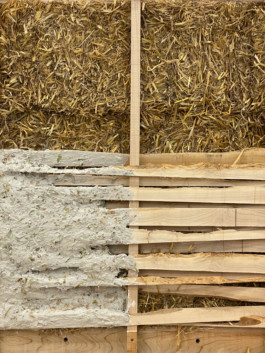

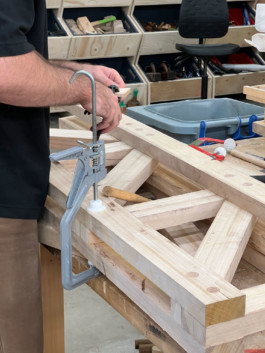
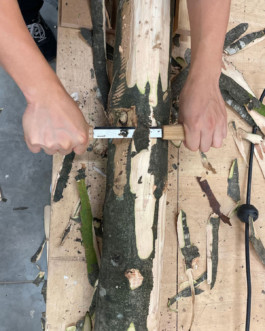
with thanks to Foxwood Forestry and Rogate Woods
STUDENTS: Antonio Abreu, Zahra Ghizlene Badaoui, Elise Blackmore, Cameron Carrington, Zhongyang Chen, Can Danisman, Lucy Daw, Samuel Fraquelli, Leo Hui, Ellie Johnson, Harry Kendall, Emilia Kepista, Irmak Kuzu, Emily Llumigusin, Amadeo Martini, Joy Matashi, Hannah Millett, Michael Parish, Dominica Piatek, Hannah Robinson, Leyla Salih, Dilushanan Selvarajah, Sabina Shaybazyan, Rowan St John, Adam Stanford, Humzah Uzzaman, Elliot Wedge
Resilient Systems, 2022
▣ TYPE: Postgraduate technical research
⧇ INSTITUTION: Central Saint Martins MArch
▤ KEY MATERIALS: Eucalyptus / Hazel / Poplar / Sweet Chestnut / Sycamore
▦ METHODOLOGY: Site Survey / Drawing / 1:1 Mock-ups
⧆ COLLABORATORS: Henry Stringer / Structure Workshop / Jez Ralph
As forestry practices shift to a more ecologically driven approach, we may be moving away from our more standard construction timbers. Short rotation coppice has the potential to deliver large volumes of timber at speed whilst providing rich habitat and eucalyptus is a climate resilient species that produces large section timbers at speed.




Many trees have as yet been neglected by UK classification systems such as grading which gives timber a structural rating which can be used by engineers irrespective of species. This makes them harder to specify, meaning either the engineer has to take conservative estimate of strength - leading to waste, or test a batch of timber - as well as additional costs, logistics and lead times. Familiarising ourselves with these timbers and demonstrating ways in which they can be applied in construction will be crucial in transitioning away from a monocultural approach to production.





with thanks to Foxwood Forestry and Rodgate Woods
STUDENTS: Antonio Abreu, Zahra Ghizlene Badaoui, Elise Blackmore, Cameron Carrington, Zhongyang Chen, Can Danisman, Lucy Daw, Samuel Fraquelli, Leo Hui, Ellie Johnson, Harry Kendall, Emilia Kepista, Irmak Kuzu, Emily Llumigusin, Amadeo Martini, Joy Matashi, Hannah Millett, Michael Parish, Dominica Piatek, Hannah Robinson, Leyla Salih, Dilushanan Selvarajah, Sabina Shaybazyan, Rowan St John, Adam Stanford, Humzah Uzzaman, Elliot Wedge
Unit 15, Regent Studios, 8 Andrews Road, London E8 4QN
E info@materialcultures.org
T 02030626832
Unit 15, Regent Studios, 8 Andrews Road, London E8 4QN
E info@materialcultures.org